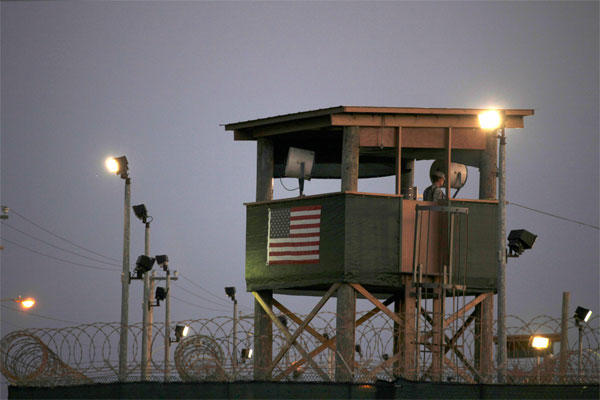President Obama on Wednesday announced the beginning of the end of the decades-old U.S. embargo of Cuba, opening the door to normal relations by re-establishing an American embassy in Havana and sending a U.S. delegation there next month for talks on U.S.-Cuba migration.
But left out of Obama's announcement is what normalization of relations may mean for the future of the American naval base and post-9/11 detention facility at Guantanamo Bay.
The U.S. has had a military presence in Guantanamo Bay since it helped the Cubans oust the Spanish during the Spanish-American War. But in the years after that war, the U.S. entered into a lease that granted the U.S. the right to build and operate a naval base there with sole jurisdiction over the area.
In return, Cuba got about $2,000 in gold per year, an amount now up to more than $4,000, though the Cuban government has not accepted the money since its revolution succeeded in 1959.
Lawrence Korb, a senior adviser with the Center for Defense Information and a former senior Defense official during the Reagan administration, said normalization "will probably open [the lease] up to negotiations."
In fact, Korb said the U.S. should consider getting out of Cuba.
"We probably should be out of there," he said. "It's caused us lots of problems. It was a way for us to get around U.S. laws and traditions, which came back to hurt us with this torture thing."
Prof. Jeffrey A. Engel, an expert on American presidents and U.S. diplomatic history at Southern Methodist University in Dallas, said it's possible "the two sides will agree to discuss this at some future date, but [in language] that is completely noncommittal."
"I have no doubt whatsoever that the Cubans would like to see the Americans leave their island," Engel said. "It's been a sore point in the national psyche for the Cubans." In some ways the base is a reminder of Cuba's broader colonial legacy, which fueled much of the communist revolution to start with, he said.
That said, however, it's not likely the U.S. will give up its presence on Cuba.
"It seems very unlikely to me that the U.S. government will totally give up its lease on Guantanamo," Engel said. "Even with the political quandaries over the future of the prison – no matter what one thinks of that policy – it demonstrates there is utility to having the flexibility that goes with having an offshore site, entirely subject to American regulation and jurisdiction."
That point was made two years ago by Air Force Gen. Douglas Fraser, the former commander of U.S. Southern Command.
"Absent a detention facility and even following the eventual demise of the Castro regime, the strategic capability provided by U.S. Naval Station Guantanamo remains essential for executing national priorities throughout the Caribbean, Latin America and South America," Fraser told lawmakers.
During his testimony, he noted that China's interests in the region are largely diplomatic and economic, "but we see them increasing their engagement militarily.
"They have offered weapons for sale, primarily some light attack aircraft, as well as air-defense radars and some other equipment. And they do provide military training opportunities for officers from various countries in the region to be educated within region," he said.
Eugene Fidell, an attorney and visiting scholar at Yale University, where he teaches a course on Guantanamo, said the base serves no real purpose to U.S. national security "and frankly it's become an albatross."
"It costs a fortune to maintain and would cost a fortune to maintain ... even without the detainees there," he said.
Fidell also dismissed China as a regional threat.
"If they're going to cozy up to the Castro regime they don't need a 'coaling station' at Guantanamo to do that," he said. "Would we like to deny powers with whom we are in tension a port? Yes, of course. But it's clear that Guantanamo is an irritant around the world because of the detainees and the military commissions."
Last year, Michael Parmly, a career diplomat who represented the U.S. Interests Section in Havana during President George W. Bush's second term, said it is long past time for the U.S. reconcile with Cuba over Guantanamo: either reach a new deal or leave.
"The central issue is why the U.S. government feels it can behave exactly as it wishes, on soil that has repeatedly -- by legislative as well as judicial branches of the United States -- been affirmed as Cuban
territory," Parmly wrote for a presentation to The Fletcher Forum of World Affairs.
"The fact is that the United States should not be in Guantánamo Bay -- at least not in its current [situation]," he wrote.
Parmly, who also held senior diplomatic posts in Bosnia, Afghanistan, France, Romania, Morocco, and at the U.S. Mission to the European Union in Brussels, said the lease treaty is a lopsided affair that gave the U.S. sole power to continue or continue it or not. It is the only agreement of its kind governing a military presence anywhere in the world, he said.
"What the U.S. government would need to do is to sit down and negotiate a standard base agreement with the Cuban authorities. The United States has done so in situations all over the world. Each one of
those situations was and is different, and yet there are commonalities to all of those arrangements. The same could be envisioned for Guantánamo Bay Naval Base."
-- Bryant Jordan can be reached at bryant.jordan@military.com





























